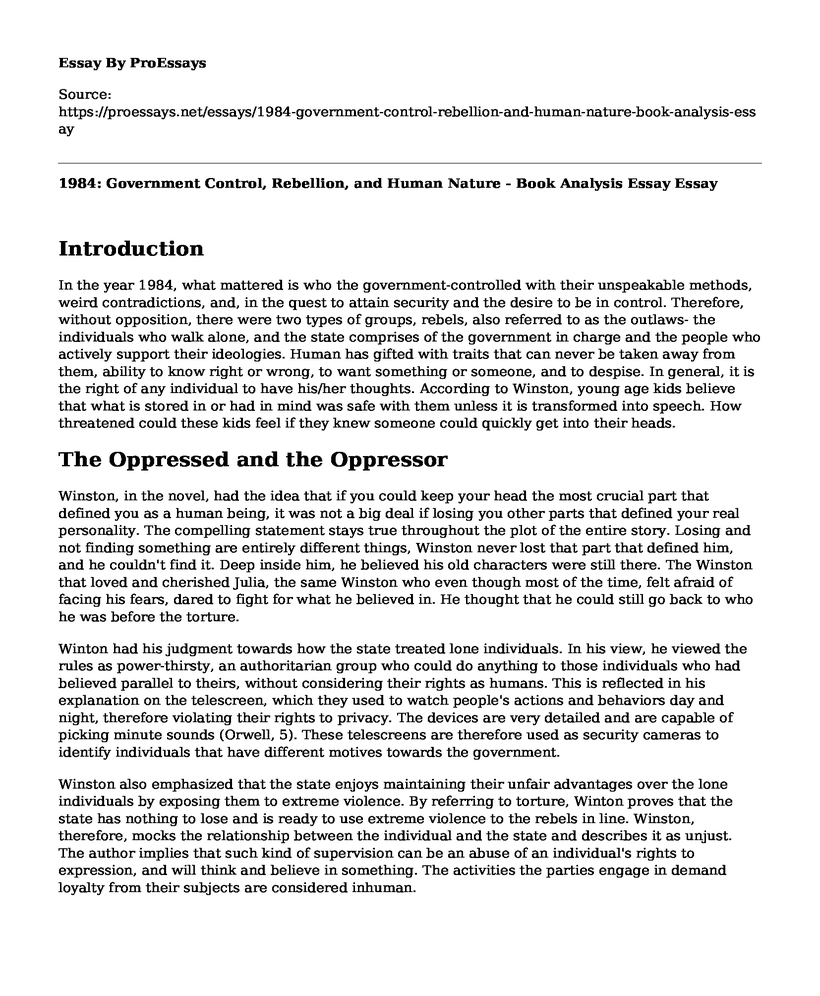Introduction
In the year 1984, what mattered is who the government-controlled with their unspeakable methods, weird contradictions, and, in the quest to attain security and the desire to be in control. Therefore, without opposition, there were two types of groups, rebels, also referred to as the outlaws- the individuals who walk alone, and the state comprises of the government in charge and the people who actively support their ideologies. Human has gifted with traits that can never be taken away from them, ability to know right or wrong, to want something or someone, and to despise. In general, it is the right of any individual to have his/her thoughts. According to Winston, young age kids believe that what is stored in or had in mind was safe with them unless it is transformed into speech. How threatened could these kids feel if they knew someone could quickly get into their heads.
The Oppressed and the Oppressor
Winston, in the novel, had the idea that if you could keep your head the most crucial part that defined you as a human being, it was not a big deal if losing you other parts that defined your real personality. The compelling statement stays true throughout the plot of the entire story. Losing and not finding something are entirely different things, Winston never lost that part that defined him, and he couldn't find it. Deep inside him, he believed his old characters were still there. The Winston that loved and cherished Julia, the same Winston who even though most of the time, felt afraid of facing his fears, dared to fight for what he believed in. He thought that he could still go back to who he was before the torture.
Winton had his judgment towards how the state treated lone individuals. In his view, he viewed the rules as power-thirsty, an authoritarian group who could do anything to those individuals who had believed parallel to theirs, without considering their rights as humans. This is reflected in his explanation on the telescreen, which they used to watch people's actions and behaviors day and night, therefore violating their rights to privacy. The devices are very detailed and are capable of picking minute sounds (Orwell, 5). These telescreens are therefore used as security cameras to identify individuals that have different motives towards the government.
Winston also emphasized that the state enjoys maintaining their unfair advantages over the lone individuals by exposing them to extreme violence. By referring to torture, Winton proves that the state has nothing to lose and is ready to use extreme violence to the rebels in line. Winston, therefore, mocks the relationship between the individual and the state and describes it as unjust. The author implies that such kind of supervision can be an abuse of an individual's rights to expression, and will think and believe in something. The activities the parties engage in demand loyalty from their subjects are considered inhuman.
Conclusion
In conclusion, Winston tries to explain how the big brother strives to control every people's decisions and beliefs. They use all kinds of unimaginable methods to curb and completely stop people from rebelling. The party has a way to control what content people read, and discussions they engage in threating that if the people go against them, they would be sent to the torture chambers referred to as the Dreaded room 101 as punishment. In the rest of the novel, Orwell successfully reflects on the theme of mass control, and the government forced policies and mass brainwashing. In enforcing all this, they think they can overpower an individual's capacity to think as he/she wishes (Orwell, 3).
References
Orwell, G. (2017). George Orwell's 1984. https://www.planetebook.com/free-ebooks/1984.pdf
Cite this page
1984: Government Control, Rebellion, and Human Nature - Book Analysis Essay. (2023, Apr 08). Retrieved from https://proessays.net/essays/1984-government-control-rebellion-and-human-nature-book-analysis-essay
If you are the original author of this essay and no longer wish to have it published on the ProEssays website, please click below to request its removal:
- Because I Could Not Stop for Death - Essay on Poem Analysis
- Violence in Elkins' Imperial Reckoning Essay Example
- Mary Shelly's Frankenstein and Its Relation to Romanticism Essay
- Literary Analysis Essay Sample on Deliverance by James Dickey
- Essay on Group Dynamics as Presented in the 12 Angry Men
- Essay Example on Greeks and Their Gods: A Special Relationship
- Essay Example on Beowulf: An Epic Tale of Strength and Courage







